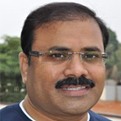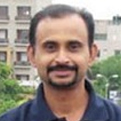Genetic & Autoimmune Diseases
Group Overview
Genetic and auto-immune diseases affect a significant number of people. Several of the auto-immune diseases also show strong genetic association to disease predisposition and progression. Most diseases are a result of a combination of complex genetic and environmental factors. It is important to look into, why only some ethnic population are genetically predisposed to develop a certain disease. Preventive measures can be taken to reduce the risk of the disease by molecular diagnosis, treatment, and genetic counseling.
Group Members:
 | Dr. P.V. RamchanderHuman/Medical Genetics |
 | Dr. R.K. SwainVascular Biology |
 | Dr. S. DevadasT cells and the immune response |
 | Dr. Sunil K. RaghavImmuno-Genomics and Systems Biology |
 | Dr. Amaresh C. PandaRNA Biology |
Major activities undertaken during last 5 years
Human genetics and molecular diagnostics group has undertaken projects to investigate the genetic and molecular basis of congenital hearing impairment, otosclerosis, otitis media and noise-induced hearing loss. Hearing impairment shows high genetic heterogeneity in terms of genes and mutations and also in the prevalence of specific mutations among different populations. The goal is to use the data emerging from genetic epidemiological studies to design molecular diagnostic protocols specific for each population.
T cell biology group focuses on understanding the role of T helper cells in Rheumatoid Arthritis, Diabetes and Asthma. The central focus is aimed at deciphering the mechanism by which physiologically relevant T helper cells convert to a pathologically aberrant cell. Using cell lines, mouse models and human samples, investigations are being carried out to understand these processes. The mandatory use of primary human and mouse T cells is to understand how they convert from a physiologically relevant T helper cell to pathologically aberrant phenotype in immune pathologies because it is extremely difficult to use only patient derived samples to understand their conversion. The group has been developing technologies by employing a multi-prong approach (e.g. flow cytometry, imaging cytometry, confocal microscopy, multiplexing, animal models, human disease samples etc.) to understand T cell biology and to define T cell function in both mouse and human physiology and pathology.
Immuno-genomics group focuses on identifying the molecular mechanisms behind the generation of immune responses by dendritic cells (DCs) that dictate T cell-mediated immunity vs immune tolerance. They have developed immune response perturbed tolerogenic DCs showing promising results in reducing the autoimmune responses by inducing development of regulatory T cells. This group is now trying to develop tolerogenic DCs in the human system and explore their therapeutic potential.
Key achievements of the group
• Identified the mutations in genes GJB2, GJB6, GJC3 and GJB3 that are commonly inherited among the hearing impaired families.
• Our findings revealed the predominance of Otosclerosis among male (0.44%) in Indian population. The identification of disease-associated variants and alteration in OPG/RANK/RANKL system and its regulator TGFB1 expression ratios in otosclerosis tissue strongly suggest the role of these genes in the disease process.
• Identified potential genes/methods that can be employed to generate tolerogenic, anti-viral and immune-suppressive dendritic cells. These immune perturbed DCs have the capability to develop immune suppressive and anti-viral responses in mice models. These results can be exploited further in humans.
• Established the role of MAPK’s in T helper presence and sensitization to death in auto-immunity.
• Established the role of reactive oxygen species (ROS) in T helper plasticity in auto-immunity.
• Established the role of Ca2+ signaling in cytotoxic T cell conversion to suppressor T cells in chronic activation.